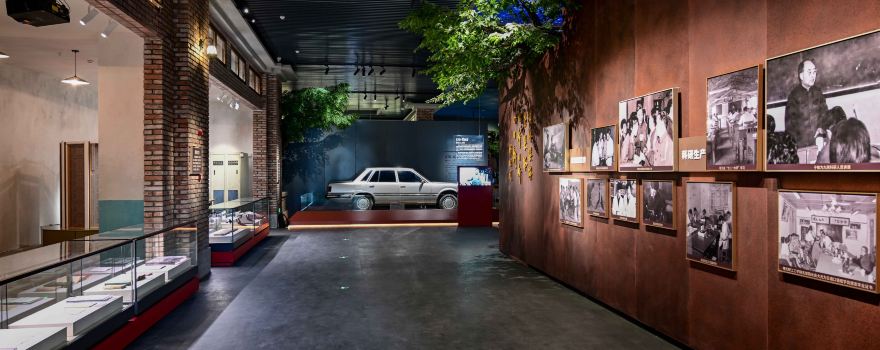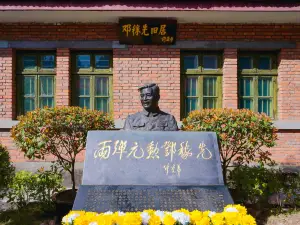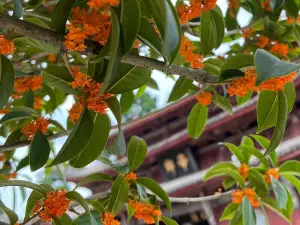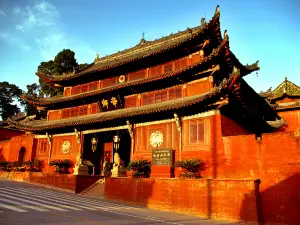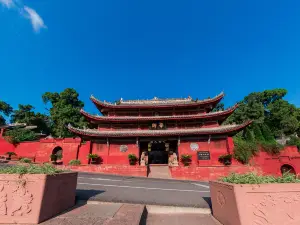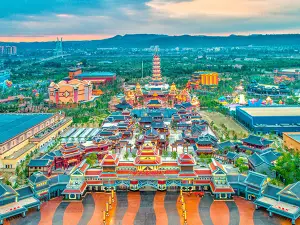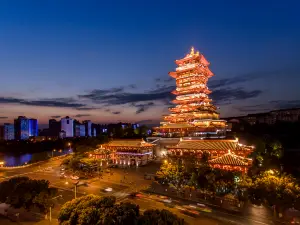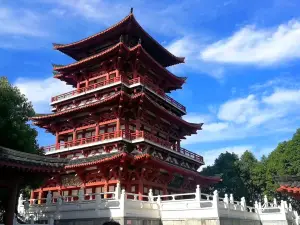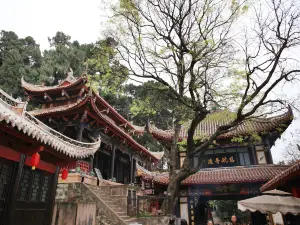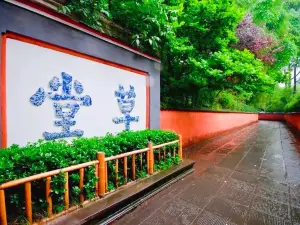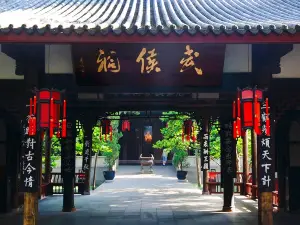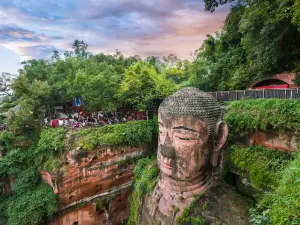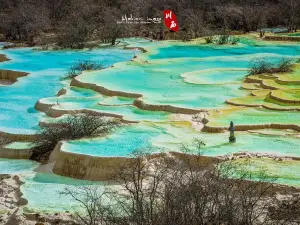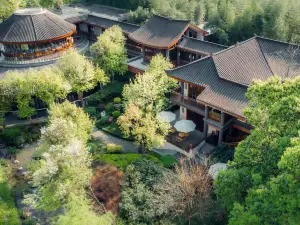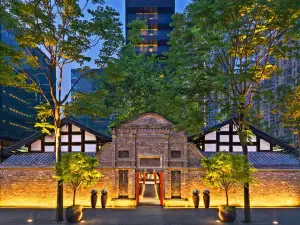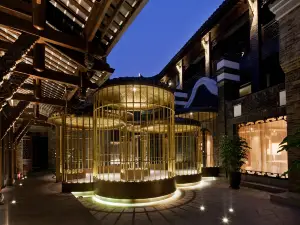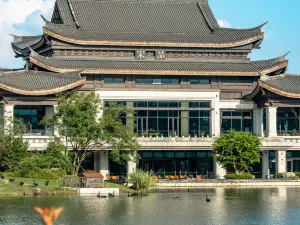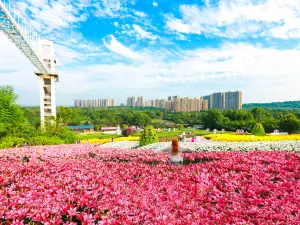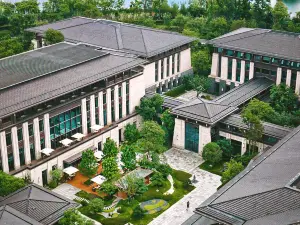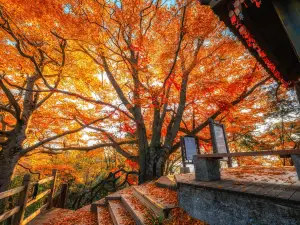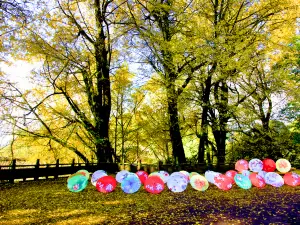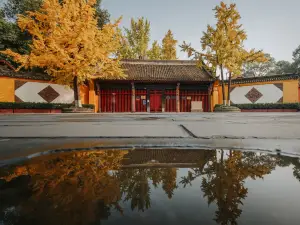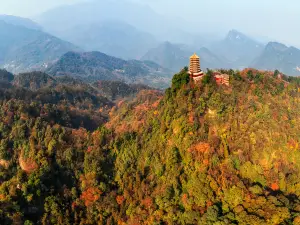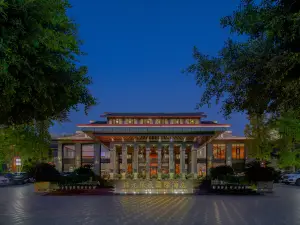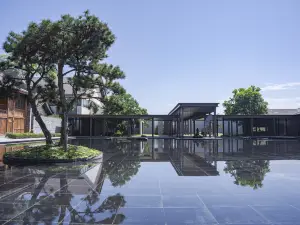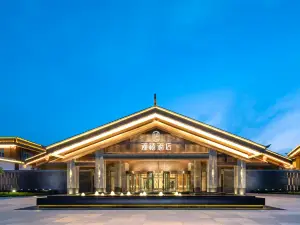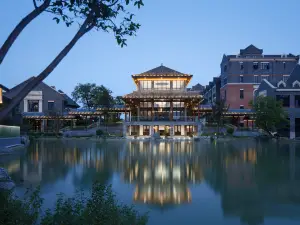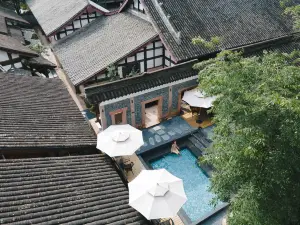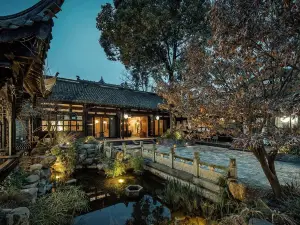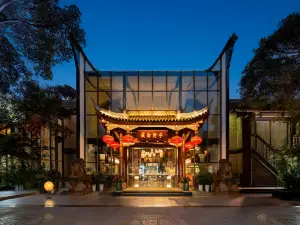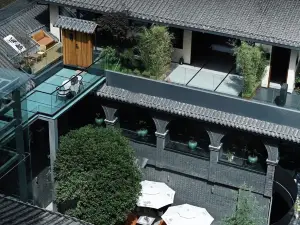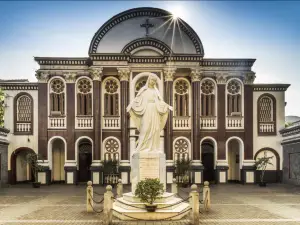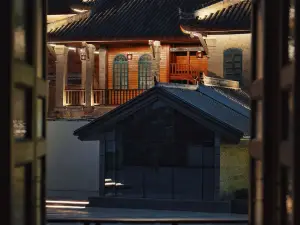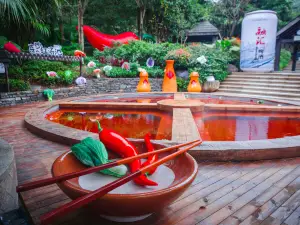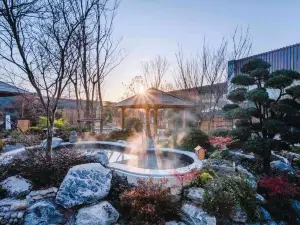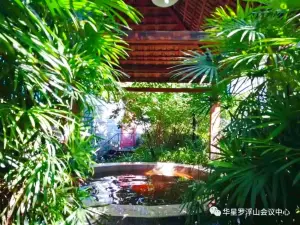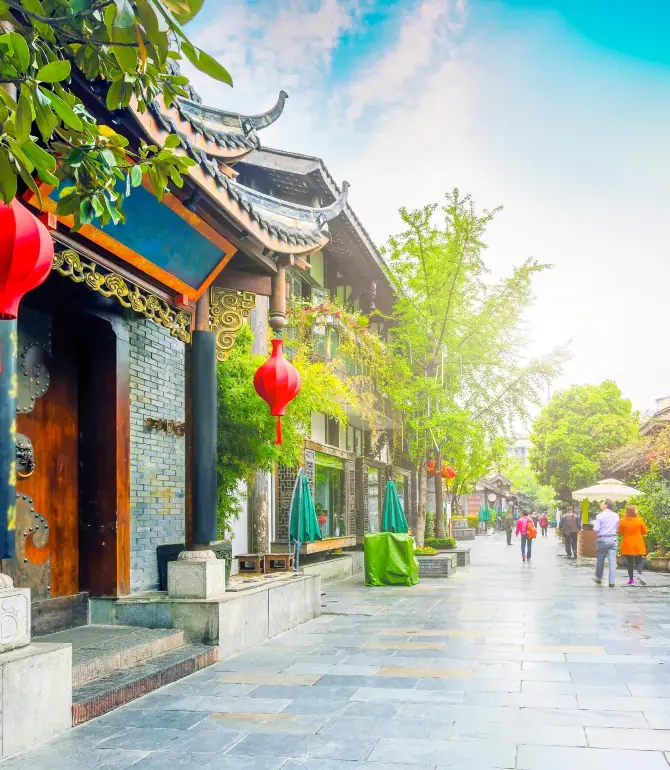Zitong
Things to do in Zitong (2025): Top nearby activities,popular attractions,itinerary planning,weather,accommodation,food,transportation,and more - all you need to know (updated October 2025) | Trip.com
About Zitong
Current weather conditions
Zitong Local Experiences Map
View local experiences on map

Trending in Zitong
Visitors from Ngawa Enjoy Free Admission to Mianyang Attractions@Qiqushan Scenic Spot
View more
Trip.Best: Zitong
View more
Things to do in Zitong
What to do
Looking for things to do in Zitong? We provide up-to-date info on everything from must-see scenic spots to local hangouts.
View more
Liangdancheng
5.4
4.7/5226 Reviews
Space Science and Technology Museum
3.1
2.0/52 Reviews
Chengdu Research Base of Giant Panda Breeding
9.4
4.5/593,754 Reviews
Shuiguanyin
2.5
4.4/520 Reviews
Where to stay
Discover the most popular places to stay in Zitong, complete with recommendations from fellow travelers and special hotel offers
View more
What to eat
Want to eat like a local? Don't miss out on these top Zitong dishes and foodie spots.
View more
Zitong Moments: Through Travelers' Eyes
Post

Combining Chinese and Western architectural art, it is the most complete preserved castle-style church in Sichuan.
Ellie.Barnes.29

Free admission to Anyue Stone Carvings before December 31! Save this two-day in-depth travel guide
Ava Bell 678_

Sichuan's Hidden Champion! Anyue Grottoes' 4 Major Caves + Exclusive Booking Secrets Fully Revealed
David@901 King

Sichuan Zhuangjidi Street District | The Glorious Memories of Successful Scholars, the Cultural Atmosphere of Scholarly Families In Sichuan, there's a place steeped in scholarly atmosphere and history: the Zhuangjidi Street District. As its name suggests, its origins are closely tied to the imperial examination system. Throughout the ages, numerous students have studied and taken exams here. When someone achieves the top spot, legends linger in the streets and alleys, imbuing the area with an atmosphere of flourishing scholarship. The buildings in the Zhuangjidi Street District are primarily composed of gray-tiled tiles, exuding a simple and elegant aesthetic. Stone inscriptions and plaques inscribed by scholars are common throughout the alleys. These bear witness to the academic journeys of scholars and symbolize the honor and hope of their families. Walking here today, one can still feel the solemn atmosphere of success. Beyond this historical atmosphere, the neighborhood is also infused with modern cultural and creative elements. Academy-style cafes, small exhibition spaces, and handmade stationery shops seamlessly connect ancient cultural heritage with contemporary life. This place is not only a continuation of history, but also a new world for young people to feel the fragrance of books.
諸文武

Qiqu Mountain, Sichuan | A Cultural Pulse in Ancient Heritage, Exuding the Vitality of 5,000 Years of Chinese Culture Enter Qiqu Mountain in Zitong, Sichuan, and you'll discover it's more than just a temple; it's a sacred cultural site steeped in history and faith. From the majestic mountain gate to the tranquil and profound small halls, every corner exudes a sense of ancient charm. The stone steps are smoothed by time, the ancient trees whisper in the mountain breeze, and the carvings within the halls, though mottled, still reveal the ingenuity of the craftsmen. These details are not only traces of history, but also a cultural legacy. The Qiqu Mountain Grand Temple has been worshipped since the Tang and Song dynasties, enshrining deities such as Guandi, Wenchang, and Kuixingye. Its architecture and worship inherit the spiritual core of 5,000 years of Chinese culture: loyalty, righteousness, literary fortune, health, and protection. Walking through it, you'll sense a vibrant vitality that continues to flow through this land from ancient times to the present day. The beauty of Qiqu Mountain lies not only in its embrace of mountains and rivers and its numerous temples, but also in its ability to touch upon the depth of its culture. It is a sense of profoundness left by the sedimentation of history and a spiritual power that spans millennia.
諸文武

Qiqu Mountain, Sichuan | A Majestic Entrance, the Stately Gate of the Ancient Shu Sacred Land Arriving in Zitong, Sichuan, and gazing upon the entrance to the Qiqu Mountain Grand Temple from afar, one is struck by its imposing grandeur. The towering mountain gate, with its carved beams and painted rafters, and its red walls and emerald tiles, stands out against the backdrop of verdant mountains. It stands like a majestic fortress between heaven and earth, guarding this sacred land, a site of endless worship since ancient times. Climbing the steps, the imposing stone steps are flanked by towering ancient trees, their swaying shadows evoking the tranquility of history. The three characters "Qiqu Mountain" emblazoned on the gate are powerful and resolute, reminding every pilgrim and traveler that this is not just a temple, but a sacred mountain embodying loyalty, righteousness, and literary influences. The grandeur of the entrance is both a display of architectural artistry and a spiritual essence. It instantly transforms the pilgrim's state of mind—from the hustle and bustle of the mundane world to a solemn reverence, from the hustle and bustle of the world to a peaceful mind.
諸文武

Qiqushan Grand Temple in Sichuan | The fragrant Guixiang Hall fills the courtyard, and the spiritual energy of flowers and trees lingers with incense. In addition to the majestic halls dedicated to Guandi, Wenchang, and Kuixingye, the Qiqushan Grand Temple in Zitong, Sichuan, boasts a hall emitting a subtle and refreshing fragrance: the Guixiang Hall. The Guixiang Hall is named after the ancient osmanthus tree planted in front of the hall. During flowering season, the fragrance fills the courtyard, wafting on the wind and blending with the lingering Buddhist incense within the hall, creating a uniquely elegant atmosphere. Inside the hall, the statue of the Bodhisattva, with its benevolent and auspicious features, complements the sweet fragrance of the osmanthus, creating a tranquil and peaceful atmosphere. Pilgrimages to the Guixiang Hall often pray for family harmony and a stable life. Unlike the solemnity and majesty of other temples, this one possesses a more gentle and soft atmosphere. After burning incense, believers often pause beneath the osmanthus tree to quietly make a wish, as if the flowers, trees, and spirits of heaven and earth are witnessing their prayers. The beauty of Guixiang Hall lies not in its grandeur but in its "peaceful fragrance that reaches the heart." It reminds us that, beyond fame, loyalty, and avoiding disaster, life also requires a sense of daily peace and tranquility.
諸文武

Qiqushan Grand Temple in Sichuan | Wenchang Emperor Hall: A Millennium of Incense, Guardian of Fame in an Academy-like Atmosphere At the Qiqushan Grand Temple in Zitong, Sichuan, the most popular venue is undoubtedly the Wenchang Emperor Hall. Since the Tang Dynasty, this place has been renowned as the "Hometown of Wenchang," and has been revered by countless scholars as a spiritual sanctuary for seeking fame and success in their studies. Entering the hall, one sees the golden statue of Wenchang Emperor seated, neatly dressed, his expression solemn and benevolent. The murals and plaques within the hall record the stories of scholars and students throughout the ages who have come here to burn incense and pay their respects. It is said that Wenchang Emperor of Qiqushan "grants all prayers," and whether praying for success in the imperial examinations or pursuing academic advancement today, pilgrims firmly believe that praying here will bring them blessings. Incense curls perpetually in front of the hall, and many students and their parents come to burn incense, clasping their hands together and silently praying for success in the imperial examinations. Parents pray for their children's academic success and a stable life. This solemn and earnest prayer constitutes the unique spiritual landscape of Qiqu Mountain.
諸文武
View more
Best of Zitong
Popular Types of Attractions in Zitong
Sightseeing tours | Night view | Boat tour | Cable car | Historical attractions | Nature and wildlife | Natural scenery | Mountain climbing | Beaches and shores | Cultural institutions | Themed exhibition halls | Museums | Science & technology museums | Leisure activities | Farms and pastures | Camping and campsites | Spa/massage | Parks | Amusement parks | Ice and snow parks | Film and television bases | Exhibitions & events | Performances | Exhibitions | Concerts | Outdoor activities | Mountain climbing | Hiking | Water sports | Skybound experiences
Popular Attractions in Zitong
Popular Ranked Lists
Top 10 Luxury Hotels near Madison | Popular Trending Attractions in Kaifeng | Top 50 Luxury Hotels near Azumino | Top 50 Must-Visit Restaurants in Hong Kong | Popular Trending Attractions in Osaka | Popular Luxury Hotels Near Kitami | Top 10 Luxury Hotels near Indianapolis | Top 20 Luxury Hotels near Los Altos | Top 50 Must-Visit Restaurants in Paris | Popular Luxury Hotels Near Cartagena | Popular Trending Attractions in Dujiangyan | Top 10 Trending Attractions in Qingdao | Top 20 Must-Visit Restaurants in Zibo | Popular Luxury Hotels Near Cuxhaven | Top 10 Luxury Hotels near Bedford Park | Top 50 Must-Visit Restaurants in Rome | Top 50 Must-Visit Restaurants in Fukuoka | Top 50 Luxury Hotels near Harwich | Popular Trending Attractions in Yantai | Top 10 Trending Attractions in Chongqing | Top 10 Luxury Hotels near Champaign | Top 10 Luxury Hotels near Santiago | Top 10 Trending Attractions in Dubai | Top 50 Must-Visit Restaurants in Osaka | Top 50 Must-Visit Restaurants in Seoul | Top 50 Luxury Hotels near Mandelieu La Napoule | Top 20 Luxury Hotels near Metz | Top 10 Luxury Hotels near Notre Dame | Top 20 Trending Attractions in Chengdu | Top 10 Trending Attractions in Nanning
Popular Restaurants in Zitong
爱达乐(梓潼兴发广场店) | 绝味鸭脖(梓潼店) | 李家清真牛肉牛杂店 | 周肥肠(梓潼直营一店) | 杨肥肠小火锅(梓潼店) | Myloca Coffee& Tea | 全家湃客咖啡(广福路店) | 梓潼柏雅云舍酒店·餐厅 | 巴嘴香干锅(桂香路店) | 川溪坝子火锅(汇鑫商业步行街店) | 绿豆养身汤 | 绝味鸭脖(人民广场店) | 将进酒 | 德克士(梓潼店) | 宝利来蛋糕(鑫驰广场店) | HONG BEI SHI GU | 江油罗肥肠(万基国际广场店) | 鸡酱法(德诚时代广场店) | 洋瓷碗老火锅 | 茶百道(广场店) | 爱达乐(梓潼德诚店) | 华莱士(梓潼店) | 书亦烧仙草(崇文街店) | 夜来香 | 南方鸭肠王(梓潼店) | 石棉烤肉(兴发广场店) | 宝利来(东十字店) | 大味美蛙鱼头(梓潼店) | 潮牛道养生汤锅(梓潼店) | 银河烧鸡公(九块石店)
Popular Destinations
Svalbard Travel | Flores Travel | Wanxian Moutain Travel | Abag Banner Travel | Ningqiang Travel | Chiisagata District Travel | Subic Bay Travel | Tiruchirappalli District Travel | Rocha Travel | Dobbs Ferry Travel | Kortrijk Travel | Canela Travel | Cascade Travel | Tunis Travel | Curry County Travel | Chisago County Travel | Valldemossa Travel | Crawford County Travel | Xinzheng Travel | Jihlava Travel | Lubbock County Travel | Eisenstadt Travel | Brougham Travel | Loderup Travel | Cedar Run Travel | Mauritius Travel | Tomioka Travel | Trakai District Municipality Travel | South Point Travel | Highlands County Travel
Recommended Attractions at Popular Destinations
Popular Attractions in Kuala Lumpur | Popular Attractions in Walt Disney World Resort | Popular Attractions in Chefchaouene | Popular Attractions in Sydney | Popular Attractions in Zanzibar Island | Popular Attractions in Paris | Popular Attractions in Bali | Popular Attractions in Rome | Popular Attractions in London | Popular Attractions in West Lake | Popular Attractions in Osaka | Popular Attractions in Bangkok | Popular Attractions in Tokyo | Popular Attractions in Singapore | Popular Attractions in Kyoto | Popular Attractions in Los Angeles | Popular Attractions in Beijing | Popular Attractions in Iguazu National Park(Argentina) | Popular Attractions in Barcelona | Popular Attractions in Las Vegas | Popular Attractions in New York | Popular Attractions in Dubai | Popular Attractions in Shanghai | Popular Attractions in Phuket | Popular Attractions in Melbourne | Popular Attractions in Florence | Popular Attractions in Chengdu | Popular Attractions in Madrid | Popular Attractions in Istanbul | Popular Attractions in Jungfrau Region
Popular Trip Moments
Sichuan's Hidden Champion! Anyue Grottoes' 4 Major Caves + Exclusive Booking Secrets Fully Revealed | Mianyang, Sichuan — An Underrated Treasure City! | Escape the Hustle Guide: Unlocking the Castle-Style Churches of Northern Sichuan!! | Hiking the 'Dragon's Back' Trail of Wolong Mountain | With such heavy-handed restoration, this Tang Dynasty cliff carving is ruined. | This century-old stone archway bears witness to the silent epic of 143 women. | I stayed at the Chongwen Banyue Wanxin Zhige Hotel in Mianyang and had a wonderful time. | A Wonderful Stay at the Grand Mercure Zhitong Chongwen Banyuetan Hotel in Mianyang | Jianmen Pass and Jianmen Greenway 2-Day Tour: A Super Detailed Guide to Save Now | Definitely worth a visit, Qiqu Mountain Temple in Mianyang, Sichuan | Jinyuanli Hotel | A Luxurious Journey Back in Time | Mianyang Zitong | Qiqu Mountain Temple | Jianmen Pass - Jianmen Greenway | 2-Day Tour Guide to the Treacherous Shu Roads | Mianyang, Sichuan | Qiqu Mountain, the ninth most famous mountain in the world. | Guangyuan-Mianyang 2-Day Tour: Explore Two Cities Without a Hitch! | 2-Day Guangyuan-Mianyang Tour: No More Planning, Just Read This! | Qiqu Mountain Temple | Murals of Qiqushan Temple in Mianyang | Yingmeng Xiantai of Qiqu Mountain Temple (Part 2) | Explore Mianyang's World-Class Scenery | Qiqu Mountain Temple (Part 4)
More Things To Do in Zitong
Mianyang Travel Photography[Follow-up photography, parent-child photos, couple, girlfriends, children, family travel photos] | Mainland China 5G eSIM | Day Pass/Total Data Package | 1-30 Days | 24-Hour Billing | QR Code | Mainland China | 5G eSIM | Day Pass/Total Package | 24H Billing | 1-30 days | QR code | Mainland China/Hong Kong/Macau 5G eSIM | TikTok available | Daily Package/Total Data Package | 1-30 Days | 24-Hour Billing | QR Code | Global (66 countries) | 5G/4G eSIM | Total Package | 24H Billing | 1-7 days | QR code | Mainland China/Hong Kong/Macao/Taiwan | 5G eSIM | Day Pass/Total Package | 24H | 1-30 days | QR code | China eSIM | 5G/4G | Daily package/Data package | High-speed data | Natural day | 1-30 days | QR code | Global 77 Countries 4G/5G eSIM | Day Pass/Total Data Package | 1-30 Days | 24-Hour Billing | QR Code | Mainland China eSIM | Supports ChatGPT & TikTok | 1–30 Days | Instant QR | Asia 9 Destinations 5G eSIM | Japan, Thailand, Vietnam, Indonesia, Korea & More | 1–30 Days | Instant QR | Asia 8 countries 4G/5G eSIM | DayPass/Total | 1-30 days | QR code | China Mainland 5G/4G eSIM | DayPass / Total | 500MB/day - Total 30GB | 1-30 Days | 24-Hour Billing | QR Code | Southeast Asia (7 countries) | 5G/4G eSIM | Day Pass/Total Package | 24H Billing | 1-30 days | QR code | Mainland China/Hong Kong/Macau | 4G eSIM | Day Pass/Total Package | Natural Day Billing | 1-30 days | QR code | Mainland China · Hong Kong · Macau 5G eSIM | TikTok Access | 1–30 Days | Instant QR | Global (72 countries) | 4G/5G eSIM | Total Package | 365-day validity | 24H Billing | Real-Name Auth Required (Hong Kong & Taiwan) | QR code | Global 108 Destinations 5G eSIM | One eSIM, Worldwide Coverage | 1–30 Days | Instant QR | [China, Hong Kong and Macau] 4G network | Unlimited traffic | Self-pickup at the airport | WiFi rental, high-speed traffic, shared by multiple people, ready to use at startup, 12H standby, 24H customer service | [5G SIM Card] China Mobile 5G SIM Card | Can make calls, enjoy smooth calls and surf the Internet (24-hour pick-up | Shanghai Pudong T1/T2) | Global eSIM (149 countries/regions) 4G/5G | eSIM | China Mobile CMLink | 1-30 day optional | Instant order and use | Supports hotspots | QR Code | Asia (12 countries) | 4G/5G eSIM | Total Package | 365-day validity | 24H Billing | Real-Name Verification Required for Hong Kong & Taiwan | QR code | China Mainland + Macau 5G/4G eSIM QR Code by China Unicom | Deyang Travel Photography[Driver and director + aerial microfilm + makeup and clothing + itinerary customization + free negatives + unlimited number of people] | Mainland China | 5G eSIM | High-speed data | Voice calls included on some plans | Daily Pass / Total Data Package | 1-30 days | Natural day | QR code | 5G SIM Card: China 5G Universal SIM Card with 30GB/80GB of unlimited 5G data and a free Shanghai PASS (Pick up at Shanghai Pudong Airport) for unlimited travel in Shanghai | [Mainland China] 5G | eSIM Internet Card | China Mobile CMLink | 3-15 days optional | Ready to use | Hotspot supported | QR Code | Mainland China/Hong Kong/Macau/Taiwan eSIM | 5G/4G | Day Pass/Total Data Package | 1-30 days | 24-Hour Billing | QR code | Global (100 countries) 4G/5G eSIM | DayPass/Total | 500MB/day - 30GB Total Data | 1-30 days | 24-hour billing | QR code | Langzhong Travel Photography[Travel photography/Wedding photo commercial photography/Micro film promotional aerial photography/ private charter tour guide and translation] | 5G SIM Card: China Unicom 5G SIM Card | Unlimited calls and internet (24-hour pickup | Shanghai Pudong T1/T2)
About
Payment methods
Our partners
Copyright © 2025 Trip.com Travel Singapore Pte. Ltd. All rights reserved
Site Operator: Trip.com Travel Singapore Pte. Ltd.
Site Operator: Trip.com Travel Singapore Pte. Ltd.
